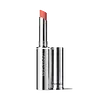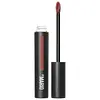What's inside
What's inside
 Key Ingredients
Key Ingredients

 Benefits
Benefits

No benefits
 Concerns
Concerns

 Ingredients Side-by-side
Ingredients Side-by-side

Dimethicone
EmollientSynthetic Wax
AbrasiveTrimethylsiloxysilicate
EmollientOctyldodecanol
EmollientEthylene/Propylene Copolymer
AbrasivePassiflora Edulis Seed Oil
EmollientPolyhydroxystearic Acid
EmulsifyingSilica
AbrasiveDisteardimonium Hectorite
StabilisingAroma
Mica
Cosmetic ColorantCI 77891
Cosmetic ColorantCI 77491
Cosmetic ColorantCI 77492
Cosmetic ColorantCI 77499
Cosmetic ColorantCI 77163
Cosmetic ColorantCI 42090
Cosmetic ColorantCI 77742
Cosmetic ColorantCI 15850
Cosmetic ColorantCI 45380
Cosmetic ColorantCI 73360
Cosmetic ColorantCI 45410
Cosmetic ColorantCI 19140
Cosmetic ColorantCI 15985
Cosmetic ColorantDimethicone, Synthetic Wax, Trimethylsiloxysilicate, Octyldodecanol, Ethylene/Propylene Copolymer, Passiflora Edulis Seed Oil, Polyhydroxystearic Acid, Silica, Disteardimonium Hectorite, Aroma, Mica, CI 77891, CI 77491, CI 77492, CI 77499, CI 77163, CI 42090, CI 77742, CI 15850, CI 45380, CI 73360, CI 45410, CI 19140, CI 15985
Dimethicone
EmollientDimethicone/Vinyl Dimethicone Crosspolymer
Skin ConditioningPolyglyceryl-2 Triisostearate
EmulsifyingBis-Diglyceryl Polyacyladipate-2
EmollientKaolin
AbrasiveC18-36 Acid Triglyceride
EmollientPolybutene
Aroma
Pentaerythrityl Tetra-Di-T-Butyl Hydroxyhydrocinnamate
AntioxidantPolyhydroxystearic Acid
EmulsifyingPassiflora Edulis Seed Oil
EmollientTitanium Dioxide
Cosmetic ColorantIron Oxides
CI 19140
Cosmetic ColorantCI 15985
Cosmetic ColorantCI 15850
Cosmetic ColorantCI 45410
Cosmetic ColorantCI 73360
Cosmetic ColorantCI 42090
Cosmetic ColorantCI 77163
Cosmetic ColorantCI 77742
Cosmetic ColorantDimethicone, Dimethicone/Vinyl Dimethicone Crosspolymer, Polyglyceryl-2 Triisostearate, Bis-Diglyceryl Polyacyladipate-2, Kaolin, C18-36 Acid Triglyceride, Polybutene, Aroma, Pentaerythrityl Tetra-Di-T-Butyl Hydroxyhydrocinnamate, Polyhydroxystearic Acid, Passiflora Edulis Seed Oil, Titanium Dioxide, Iron Oxides, CI 19140, CI 15985, CI 15850, CI 45410, CI 73360, CI 42090, CI 77163, CI 77742
Ingredients Explained
These ingredients are found in both products.
Ingredients higher up in an ingredient list are typically present in a larger amount.
Aroma refers to an ingredient, or mixture of ingredients, that impart or mask a flavor.
The name is slightly confusing. This is because INCI associates aroma with flavor instead of smell.
Here is the official definition from the The International Cosmetic Ingredient Dictionary and Handbook:
“Aroma is a term for ingredient labeling used to identify that a product contains a material or combination of materials normally added to a cosmetic to produce or to mask a particular flavor.”
INCI shows the only purpose of aroma to be "flavouring".
However, due to regulation differences, some companies may use aroma in place of parfum.
In Canada, this ingredient only has to be listed in concentrations above 1%.
Learn more about AromaCi 15850 is the pigment color red. It is an azo dye and created synthetically.
Azo dyes need to be thoroughly purified before use. This allows them to be more stable and longer-lasting.
This ingredient is common in foundations, lipsticks, and blushes. This color is described as brown/orangey red.
It has many secondary names such as Red 6 and Red 7. According to a manufacturer, Red 6 usually contains aluminum.
Learn more about CI 15850Ci 15985 is a dye made from petroleum. It is synthetically created and approved by the FDA for use in foods and cosmetics.
The color of this dye is orange/yellow.
This ingredient can be found in makeup, sun care, and skincare.
Learn more about CI 15985CI 19140 is also known as Tartrazine. Tartrazine is a synthetic dye used in cosmetics, foods, and medicine to add a yellow color.
Tartrazine is created from petroleum and is water-soluble.
Some people may experience allergies from this dye, especially asthmatics and those with an aspirin intolerance.
Learn more about CI 19140Ci 42090 is a synthetic dye created from petroleum. It is used to give a bright blue color to cosmetics, medicine, and food.
CI 45410 is a synthetic red-pigment and dye.
It often goes by both Red 28 or Red 27; manufacturers label both ingredients as CI 45410.
This dye is commonly found in makeup because it imparts a vivid color. Some types of this dye change color based on pH level and interaction with moisture:
Your skin has a natural pH of around 4.5 - 5.5.
According to the FDA, CI 45410 is not permitted for use in eye products.
Red 27 is a flourescein dye and commonly used as a fluorescent tracer in medicine.
Learn more about CI 45410Ci 73360 is a synthetic red-pink dye.
This synthetic powder is used to add a pearly/white color in cosmetics.
This ingredient is used to add a violet color to cosmetics.
It is created by reacting phosphoric acid, ammonium dihydrogen orthophosphate, and manganese dioxide.
Dimethicone is a type of synthetic silicone created from natural materials such as quartz.
What it does:
Dimethicone comes in different viscosities:
Depending on the viscosity, dimethicone has different properties.
Ingredients lists don't always show which type is used, so we recommend reaching out to the brand if you have questions about the viscosity.
This ingredient is unlikely to cause irritation because it does not get absorbed into skin. However, people with silicone allergies should be careful about using this ingredient.
Note: Dimethicone may contribute to pilling. This is because it is not oil or water soluble, so pilling may occur when layered with products. When mixed with heavy oils in a formula, the outcome is also quite greasy.
Learn more about DimethiconePassiflora Edulis Seed Oil is an oil and isn't fungal acne safe.
Polyhydroxystearic Acid is a soft wax made from castor oil.
It is is a texture thickener, emulsifier, and film-former. Emulsifiers prevent ingredients from separating, such as oils and waters.
Polyhydroxystearic Acid may not be fungal acne safe.
Learn more about Polyhydroxystearic Acid